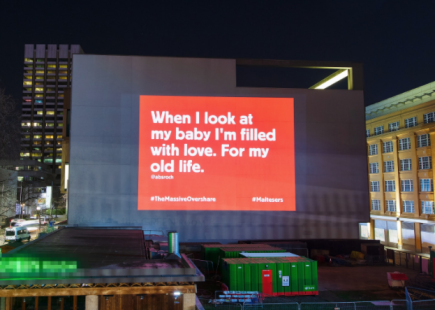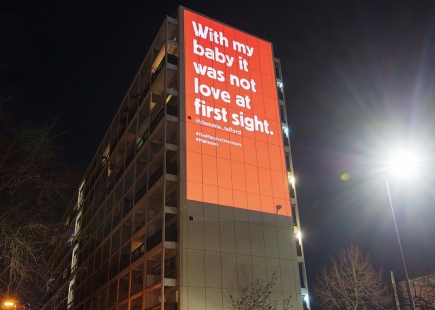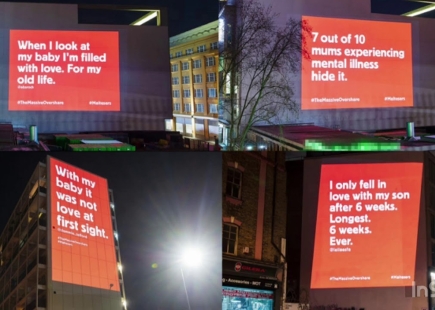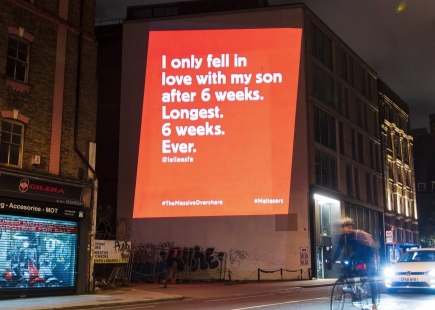Maltesers' post-partum mental health campaign: Does it matter where the message comes from?

The Background
We all know there’s the odd sleepless night and nappy to be changed, but with your new bundle of joy growing, giggling and cooing in your arms, the accepted world view is that becoming a new mum is a truly magical experience.
But what if your reality doesn’t match up to the ideal?
For many women, their motherhood experience was not written by Disney.
They don’t form an instant connection with their new born, they hate their physical changes and to make matters worse, the stigma associated with not being a ‘perfect mum’ prevents mums from seeking support.
The Big Idea
#TheMassiveOvershare by Malteser's aimed to tackle this issue by encouraging mums across the UK to help normalise conversations about maternal mental health.
This helped with both understanding and recognition for an issue that is frequently undetected and misdiagnosed.
What They Did
The campaign appears to be fully integrated with out-of-home, social and PR all accounted for.
Out of home projections showcased powerful ‘overshares’ from mums, seemingly crowd-sourced from social media and starkly outlined how they actually felt after giving birth.
The news story established the issue on how uncomfortable new mums find talking about sensitive elements of new motherhood and was supported by interviews and posts from ex-Pussycat Doll, turned maternal mental health campaigner, Ashley James.




The Review
The complaints seem to centre on two issues; firstly, why the hell is a chocolate brand talking about postpartum depression? Secondly, why is the campaign called ‘The Massive Overshare’?
The first question was posed almost entirely by people ‘in the industry’ and I confess it was my first instinct too, but then I showed it to my wife, mother to our six-month-old baby.
Her reaction was “FINALLY.”
In the weeks that followed our daughter’s birth, she’d felt pressure to be a ‘happy, glowing, mum’ and more than occasionally, she just didn’t feel like that.
This campaign had absolutely nailed a true insight and a true issue.
“But why Maltesers?” I asked.
“Because mums love Maltesers and who cares? It needed saying.” Came the reply.
I can’t prove that ‘mums love Maltesers’ (other than to say it’s a chocolate that seems to over-index with women and it was always the chocolate of choice at NCT classes!), but I can go some way to proving that mums didn’t care it was Maltesers. I went through all 97 comments of Ashley James’ post and not a single one took issue with Maltesers being the messenger because they loved the message. Several (around 10), actively praised Maltesers for taking on the topic.
I can understand the ‘creative issue’. Confectionary brand doing mum’s mental health feels like a bit of a leap.
But is it any more of a leap than an ice-cream brand doing democracy, or a bookmaker making a stand against homophobia? Democracy Is In Your Hands by Ben & Jerry’s and Rainbow Russians by Paddy Power are two examples of decorated cause-led campaigns of recent years that were both a tad tenuous. I’d argue ‘a chocolate brand that is famous for sharing and is popular with mums, encouraging mums to share more’ is an imperfect link, but not offensively so.
But more importantly, who cares? What really matters? A campaign that has your creative and strategy teams patting each other’s backs about a perfectly crafted organising thought? Or a campaign with a less perfect route in, but genuinely results in mums talking about such a serious and stigmatised issue?
Society is changing and the prevailing cultural mindset is that ‘silence is violence’. We need to actively call out toxic behaviour.
Brands always talk about ‘not having a right to play’, perhaps we should be trying harder to ‘find one’? If you’ve identified an issue that your audience cares about, why not talk about it and do so with confidence. Other creatives might, but your consumer could care less about your ‘right to play’. They care about what you say and how you say it.
Obviously, there are limits. Maltesers doing an anti-obesity campaign would grate. If you’re part of the problem, you can’t be part of the solution. But if you’re definitely not the problem, you increasingly can offer a solution.
In Hindsight
Based on the reaction to Ashley’s post alone, this campaign deserves praise.
Forgive it for being a little tenuous, it categorically did get women sharing their experiences in the spirit of the campaign and that’s a fantastic outcome.
However, some of the criticism felt warranted.
Overshare is when you share something people don’t want to hear. It was argued that by calling these chats an ‘overshare’, you reinforce the idea that they are. As a result, the campaign name was criticised. This didn’t undo all the positives, but it did result in some mums actively stating that they didn’t join the conversation because of it.
Finally, this campaign can – and possibly should - be judged by Maltesers’ next cause-led campaign.
It would be a shame at best, callous opportunism at worst, if Maltesers abandoned women’s mental health and took up another, unrelated topic.
You can defend Maltesers’ right to play, but with that comes responsibility - you’ve got to play it right and you’ve got to stay in the game.
If you enjoyed this article, you can subscribe for free to our weekly email alert and receive a regular curation of the best creative campaigns by creatives themselves.
Published on:



